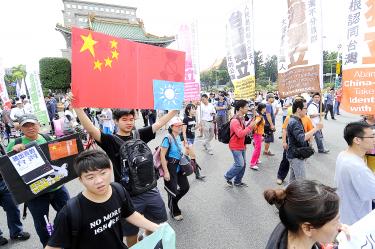Democratic Progressive Party Chairperson Tsai Ing-wen (蔡英文) yesterday said President Ma Ying-jeou (馬英九) forgot that Taiwanese are the “true masters of the nation,” adding that this is why there was not much of a festive atmosphere for Double Ten National Day yesterday.
“There is no atmosphere of festivity and celebration. In recent years, the nation has not been as prosperous as Ma described in his speech,” Tsai said in a statement. “The president has violated the Constitution to serve his own interests and those of the Chinese Nationalist Party [KMT], leaving the government incapable of solving people’s problems and the economy, and leading the nation into chaos.”
“The KMT has forgotten that the people are the masters of the nation,” Tsai said.
She said that if National Day has to be celebrated, the best way would be “for all people to live happily, and to allow people to live in a society that has freedom and democracy.”
“If the nation’s birthday is indeed worth celebrating, then let us all stand united under the democratic system, together solve any problems that we might encounter, find a good direction for the nation’s future and go through challenges together,” Tsai said.
Separately yesterday, in response to Ma’s speech, Academia Sinica deputy research fellow Huang Kuo-chang (黃國昌), who is involved with the Sunflower movement, panned remarks Ma made saying that Taiwan should serve as a model of democratization for China, Hong Kong and Macau.
Huang said that while no one, except Beijing, would oppose democratization in China, Hong Kong and Macau, it is ironic when such words come from Ma.
“In the Taiwanese struggle for democracy, Ma not only had zero contribution, but often stood on the opposite side,” Huang said. “He reserved no effort to defend the authoritarian regime and opposed direct elections for president.”
Huang said that since Ma took office in 2008, he has made many moves to compromise the nation’s democracy, including restricting freedom of expression when then-chairman of China’s Association for Relations Across the Taiwan Straits Chen Yunlin (陳雲林) visited Taiwan in 2008; causing last year’s September strife by accusing Legislative Speaker Wang Jin-pyng (王金平) of unduly using his influence; and trying to force the legislature to pass the cross-strait service trade agreement.
“How could Ma be so shameless as to say he is proud of Taiwan’s democracy?” Huang said. “It is ironic and pretentious for him to call on China to democratize, as he often caters to China at the expense of Taiwan’s democracy and the rule of law, while Hong Kongers are bravely fighting against the Chinese Communist Party for democracy and freedom.”
He said that it might be too severe to say that people should be ashamed of Ma, but Taiwanese should definitely “beware of Ma” for the good of the nation’s future.
Source: Taipei Times - 2014/10/11





















